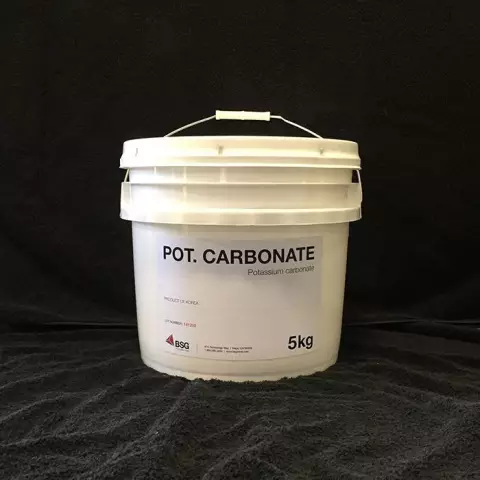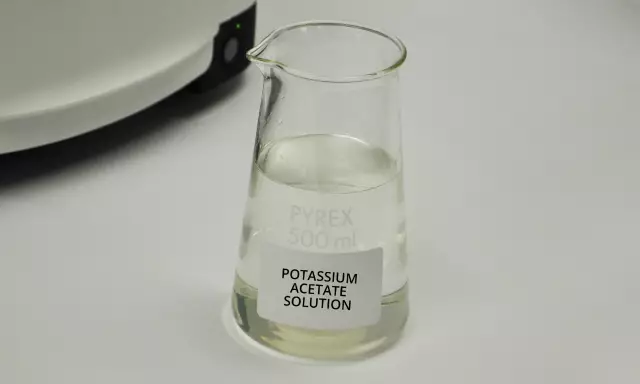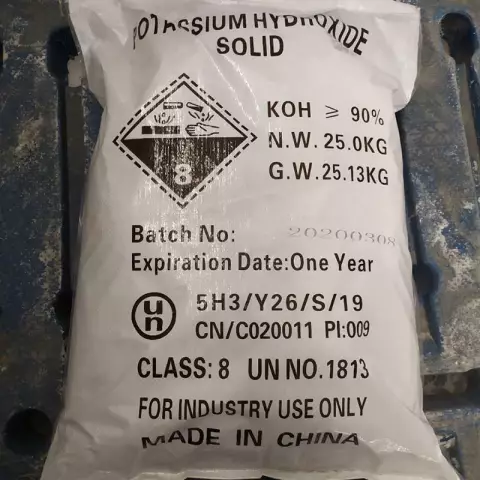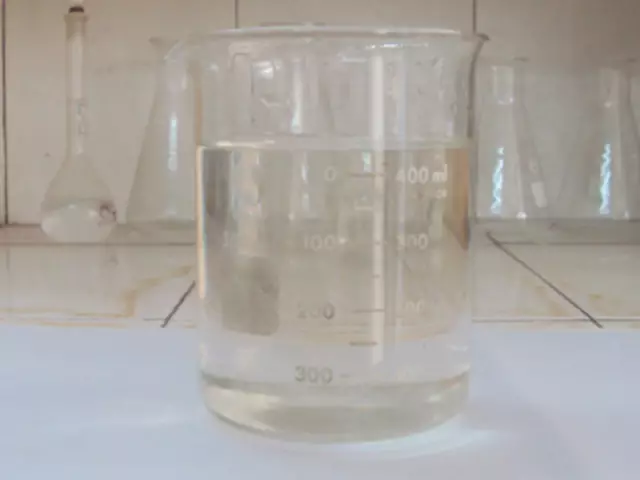- Author Rachel Wainwright wainwright@abchealthonline.com.
- Public 2023-12-15 07:39.
- Last modified 2025-11-02 20:14.
Potassium iodide Reneval
Potassium iodide Reneval: instructions for use and reviews
- 1. Release form and composition
- 2. Pharmacological properties
- 3. Indications for use
- 4. Contraindications
- 5. Method of application and dosage
- 6. Side effects
- 7. Overdose
- 8. Special instructions
- 9. Application during pregnancy and lactation
- 10. Use in childhood
- 11. In case of impaired renal function
- 12. Use in the elderly
- 13. Drug interactions
- 14. Analogs
- 15. Terms and conditions of storage
- 16. Terms of dispensing from pharmacies
- 17. Reviews
- 18. Price in pharmacies
Latin name: Potassium iodide Reneval
ATX code: H03CA
Active ingredient: potassium iodide (Potassium iodide)
Producer: PFK Obnovlenie, JSC (Russia)
Description and photo update: 2019-12-07
Prices in pharmacies: from 59 rubles.
Buy

Potassium iodide Reneval - iodine preparation for the prevention and treatment of thyroid diseases; thyroxine secretion regulator (T 4).
Release form and composition
The drug is produced in the form of tablets: round, flat-cylindrical, with a chamfer, white, on one side with or without an "R" marking (14 pieces in a blister strip made of aluminum foil and polyvinyl chloride film, in a cardboard box 4 or 8 packs and instructions for the use of Potassium iodide Reneval).
1 tablet contains:
- active substance: potassium iodide - 131 or 262 μg, which is equivalent to iodine in the amount of 100 and 200 μg, respectively;
- additional components: microcrystalline cellulose, magnesium hydroxycarbonate (basic magnesium carbonate), colloidal silicon dioxide (aerosil), lactose monohydrate (milk sugar), magnesium stearate, sodium croscarmellose.
Pharmacological properties
Pharmacodynamics
Iodine, the active ingredient Potassium iodide Reneval, is one of the vital trace elements necessary for the normal functioning of the thyroid gland. After iodides (chemical compounds of iodine) enter the epithelial cells of the thyroid follicle under the action of the enzyme iodide peroxidase, iodine ions are oxidized to form elemental iodine, which is incorporated into the alpha-amino acid tyrosine molecule. During this process, one of the parts of the tyrosine radicals in the protein thyroglobulin (TG) is iodized, as a result of which the formation of thyronines occurs, the most important of which are triiodothyronine (T 3) and thyroxine (T 4). Thyronines form a complex with TG, which accumulates in the colloid secreted by the secretory cells of the thyroid follicles.
Iodine entering the body in physiological quantities prevents the development of endemic goiter caused by iodine deficiency in food, helps to normalize the size of the thyroid gland in children (including newborns) and adolescents, and also affects the T 3 / T 4 ratio and the level of thyroid stimulating hormone.
Pharmacokinetics
When taken orally, Reneval potassium iodide is rapidly and completely absorbed in the small intestine and distributed in the intracellular space within two hours. The active substance is accumulated mainly in the thyroid gland (iodide content is higher than 0.5 mg / g of tissue), to a lesser extent in the mucous membrane of the stomach, salivary and mammary glands; also iodine passes well through the placenta.
The agent is excreted mostly by the kidneys (trace amounts are detected in the urine 10 minutes after ingestion), 80% of the dose is eliminated within 48 hours, the rest within 10-20 days. Also, the drug is partially excreted with the secretions of the bronchial, salivary, sweat and other glands.
Indications for use
- prevention of the occurrence of endemic goiter, including during pregnancy;
- prevention of recurrence of goiter after its surgical removal or completion of the course of conservative therapy with thyroid hormone preparations;
- treatment of diffuse euthyroid goiter in children (including newborns), adolescents and young adult patients.
Contraindications
Absolute:
- latent thyrotoxicosis (when using daily doses exceeding 150 mcg);
- severe thyrotoxicosis;
- dermatitis herpetiformis;
- toxic adenoma, nodular goiter in case of prescribing daily doses exceeding 300 mcg (except for preoperative therapy for the purpose of blocking the thyroid gland);
- hereditary diseases caused by lactase deficiency, glucose-galactose malabsorption or galactose intolerance (since the drug includes monohydrate in lactose);
- hypothyroidism, except when its development was triggered by severe iodine deficiency;
- hypersensitivity to iodine or any other component of the tablets Potassium iodide Reneval.
It is necessary to avoid the use of the drug during treatment with radioactive iodine, as well as in the presence of a malignant tumor of the thyroid gland or if the development of the latter is suspected.
Caution is required to use Reneval potassium iodide in patients with impaired renal function.
Potassium iodide Reneval, instructions for use: method and dosage
Potassium iodide Reneval tablets should be taken orally once a day after meals, with a sufficient amount of water.
When prescribing the drug to newborns and children under 3 years of age, before taking the tablet, you can dissolve the tablet in 1 tablespoon of boiled water at room temperature.
Recommended daily doses of Potassium iodide Reneval, depending on the indications and the patient's age (in terms of iodine content):
- prevention of endemic goiter: children (including newborns) - 100 mcg; adolescents and adults - 100-200 mcg; pregnant and breastfeeding women - 150-200 mcg;
- prevention of recurrence of goiter after its removal by surgery or after the end of the course of treatment of the disease with thyroid hormone preparations: for all patients, regardless of age - 100-200 mcg;
- therapy of euthyroid (associated with iodine deficiency) goiter: children (including newborns) and adolescents - 100-200 mcg; for young adult patients - 300-500 mcg.
For prophylactic purposes, it is usually recommended to take Reneval potassium iodide for several months or years, and in some cases, if indicated, throughout life.
In newborns, goiter therapy usually lasts 2-4 weeks; in children from one month of age, adolescents and adults - 6-12 months, but if necessary, a longer intake is possible. The course of treatment is established by the attending physician on an individual basis.
Side effects
If Reneval potassium iodide is taken according to indications in doses not exceeding the recommended ones, the development of adverse events is unlikely. In rare cases, the occurrence of allergic reactions, such as a skin rash, Quincke's edema, may be recorded.
Overdose
When using Reneval potassium iodide in daily doses above 150 mcg, there is a risk of latent hyperthyroidism turning into a manifest form. Against the background of long-term treatment with the drug in doses exceeding 300 mcg per day, iodine-induced hyperthyroidism may occur (especially in elderly patients with nodular goiter or toxic adenoma).
Symptoms of an acute overdose may include the following effects: brown staining of mucous membranes, abdominal pain and diarrhea (including melena), reflex vomiting, and in severe cases, dehydration and shock. In case of acute overdose, gastric lavage is prescribed, sodium thiosulfate is administered, symptomatic treatment of violations of the water-electrolyte balance is carried out, if necessary, anti-shock therapy.
In chronic overdose, iodism may develop, manifested by the following symptoms: dermatitis, acne, metallic taste in the mouth, inflammation and swelling of the mucous membranes (conjunctivitis, rhinitis, bronchitis, gastroenteritis), irritability, fever. In this condition, it is necessary to stop taking Reneval potassium iodide.
special instructions
Before using potassium iodide, it is necessary to make sure that there is no hyperthyroidism, nodular toxic goiter or malignant thyroid disease.
Influence on the ability to drive vehicles and complex mechanisms
Potassium iodide Reneval does not adversely affect the ability to drive vehicles and to engage in any other activities that require quick reactions and increased concentration.
Application during pregnancy and lactation
In pregnant and breastfeeding women, the need for iodine increases. Potassium iodide is recommended for use according to indications in cases where the intake of iodine with food per day is less than 150-300 mcg. However, it should be borne in mind that the drug overcomes the placental barrier quite well and is able to provoke the development of hypothyroidism and goiter in the fetus. It has also been established that iodine is excreted in breast milk. Due to the above, during pregnancy and lactation, Reneval Potassium iodide is allowed to be used only in the recommended doses.
Pediatric use
The use of Reneval potassium iodide in children, including newborns, possibly according to indications, strictly in recommended doses.
With impaired renal function
With existing functional disorders of the kidneys, drug therapy must be carried out with caution, due to the aggravation of the risk of developing hyperkalemia. In patients of this risk group, it is necessary to periodically monitor the level of potassium in the blood.
Use in the elderly
In elderly patients with nodular goiter or toxic adenoma, with prolonged use of Potassium iodide Reneval in doses of more than 300 mcg per day, the threat of iodine-induced hyperthyroidism is aggravated.
Drug interactions
- angiotensin-converting enzyme (ACE inhibitors) inhibitors, including enalapril, captopril, lisinopril: the threat of hyperkalemia is aggravated;
- antithyroid drugs: the effectiveness of these drugs and potassium iodide decreases;
- thyroid stimulating hormone: the absorption of iodine by the thyroid gland improves, and the production of its hormones is activated;
- lithium preparations: the risk of goiter and hypothyroidism increases with the simultaneous use of these drugs with iodine obtained in high doses;
- potassium perchlorate and thiocyanate: the process of capture of iodine by the thyroid gland is blocked;
- potassium-sparing diuretics: hyperkalemia may occur when these drugs are combined with iodine in high doses;
- radioactive isotopes of iodine 131 I and 123 I: absorption of these isotopes by the thyroid gland is weakened under the influence of potassium iodide.
Analogs
The analogues of Reneval's potassium iodide are: Iodomarin 200, Iodbalans, 9 months Potassium iodide, Iodomarin 100, Iodine Vitrum, Microiodide 100, Potassium iodide, Iodine Vitrum for children, Microiodide 200.
Terms and conditions of storage
Store in a place protected from light, out of reach of children, at a temperature not exceeding 25 ° C.
The shelf life is 3 years.
Terms of dispensing from pharmacies
Available without a prescription.
Reviews about Potassium iodide Reneval
Reviews of Potassium iodide Reneval, found on medical sites, are in most cases positive. Patients characterize the drug as an effective drug that replenishes iodine deficiency. When used for the treatment of diffuse euthyroid goiter, the agent reduces the severity of symptoms of the disease, prevents the occurrence of complications such as the development of nodular / toxic goiter, if taken for prophylaxis, it improves overall well-being, helps to reduce irritability and increase concentration. Also, many women were satisfied with the results of the prophylactic use of Reneval's potassium iodide during pregnancy, since the remedy helped to prevent the occurrence of an iodine deficiency state, ensuring the necessary intake of iodine in the body,which is especially important for the normal development of the fetus. The advantages of the drug include its availability and relatively low cost. However, before the course use of potassium iodide, patients recommend consulting a specialist.
There are no complaints of adverse reactions.
The price of Potassium iodide Reneval in pharmacies
The price of Potassium iodide Reneval 200 mcg can be 54-106 rubles, 100 mcg - 40-79 rubles. (per pack containing 120 tablets).
Potassium iodide Reneval: prices in online pharmacies
|
Drug name Price Pharmacy |
|
Potassium iodide Reneval 100 mcg tablets 112 pcs. RUB 59 Buy |
|
Potassium iodide Reneval 200 mcg tablets 112 pcs. RUB 65 Buy |

Anna Kozlova Medical journalist About the author
Education: Rostov State Medical University, specialty "General Medicine".
Information about the drug is generalized, provided for informational purposes only and does not replace the official instructions. Self-medication is hazardous to health!






